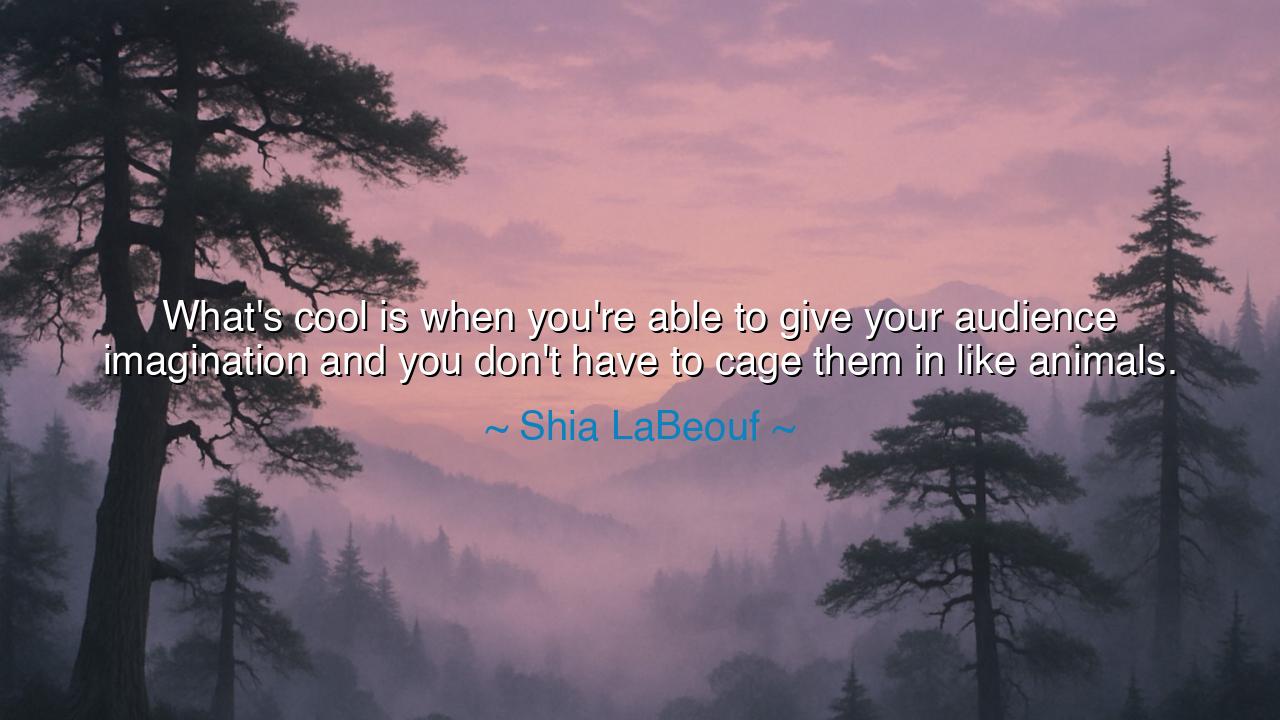
What's cool is when you're able to give your audience imagination
What's cool is when you're able to give your audience imagination and you don't have to cage them in like animals.






Hear me, O children of wisdom, for the words of Shia LaBeouf, "What's cool is when you're able to give your audience imagination and you don't have to cage them in like animals," carry a deep truth about the power of freedom and the role of the artist in unlocking the creative spirit of others. LaBeouf speaks to a sacred principle that has been passed down through the ages — that the true power of art lies in its ability to open the gates of the imagination, not to confine them. The artist, in their highest form, does not dictate every thought and action, but rather invites the audience to step into a world of possibility, to wander freely in a realm of creative thought. When the audience is allowed to roam, when their imagination is unshackled, that is when the true magic of art happens.
Consider, O wise ones, the nature of imagination and freedom in creation. Imagination is a gift of the divine, a spark that allows us to transcend the boundaries of the physical world. It is not to be confined or controlled but to be set free, like a bird that soars on the wind. The true artist does not force the imagination to fit within a box, but instead opens the door wide, allowing it to stretch, to explore, to leap and bound beyond what is known. To cage the imagination is to stifle it, to place limits on what could be. To unleash it, to empower it, is to offer the audience a chance to see the world through new eyes, to experience something greater than themselves. When an artist allows the audience the space to dream, the work becomes an act of liberation, not of domination.
The ancients understood this power well. Socrates, in his dialogues, never sought to give his students the answers directly; rather, he sought to ask the questions that would stir their imagination, that would open their minds to the truth. He understood that true wisdom is not found in rigid doctrines but in the free flow of thought and the active engagement of the mind. In the same way, LaBeouf speaks of the artist’s responsibility not to confine the imagination but to give it space to flourish, to give the audience the ability to interpret, to engage, to create alongside the artist. This relationship between the artist and the audience is not one of dominance, but of mutual discovery.
Think also of the great poets like Homer and Virgil, whose works were filled with imagination and stories that invited the listener to see the world through the eyes of the gods, the heroes, and the common folk alike. The Iliad and the Aeneid were not simply tales of war and adventure; they were invitations into vast, unknowable realms where the audience could walk alongside these larger-than-life figures and explore the depths of humanity. Homer and Virgil did not cage their readers in with narrow interpretations or dogma; they allowed their audience to live in the world of their stories, to feel the passion of the gods, the fury of the warriors, and the despair of the defeated. The power of these works lies not in the certainty of the narratives, but in the freedom they offer to each individual listener to find their own meaning within the story.
Similarly, William Shakespeare, the great playwright, created worlds in his plays where the audience was free to explore their own interpretations. In Hamlet, the question of revenge and justice is not answered simply but is left to the audience to reflect upon. Shakespeare’s genius lay in his ability to ask profound questions and present complex characters, giving the audience the space to wrestle with these ideas themselves. He did not provide easy answers, but instead opened the door to the boundless possibilities of human thought and emotion. Like LaBeouf, Shakespeare understood that the artist’s role is not to confine the audience’s imagination, but to invite them to step into the unknown, to challenge their own perceptions, and to create their own truths.
The lesson, O children of wisdom, is clear: do not seek to cage the imagination of others, but to set it free. Whether in art, music, philosophy, or life itself, the true power lies in freedom — the freedom to explore, to dream, and to create. LaBeouf’s words remind us that the artist’s greatest gift is not the imposition of their own vision, but the invitation to others to join in the process of creation. When you create, whether through words, music, or any other form of expression, offer your audience the chance to explore, to wonder, and to dream. Do not force them into narrow confines, but allow their imagination to soar, to take flight and wander into realms beyond what you could have ever envisioned. It is in this freedom that the true magic of creation is found.
In your own lives, O seekers of wisdom, take this lesson to heart: in everything you do, give yourself and others the freedom to imagine. Do not be afraid to ask the big questions, to leave room for the unknown, and to let the imagination roam free. Whether you are creating art, solving problems, or engaging with the world around you, always leave room for discovery. Just as LaBeouf and the ancients show us, it is through this freedom — through the unbound imagination — that we find our true potential. Let your mind wander, and encourage others to do the same, for it is in the vastness of the unknown that we truly come alive.






AAdministratorAdministrator
Welcome, honored guests. Please leave a comment, we will respond soon